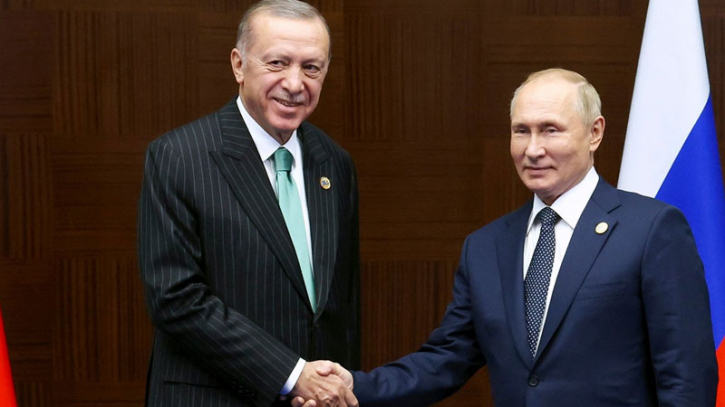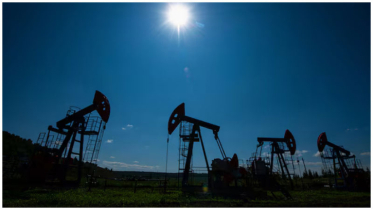Grain deal extension: Putin-Erdogan talks seen as only hope

Negotiations between Russian President Vladimir Putin and his Turkish counterpart Recep Tayyip Erdogan expected to take place soon remain the only hope to extend the Black Sea grain deal set to expire next week, a news agency reported Monday.
The grain initiative, brokered between Russia and Ukraine by the United Nations (UN) and Turkiye in July 2022, aimed to prevent a global food crisis worsened by Moscow's invasion of its neighbor by allowing trapped Ukrainian grain to be safely exported from Black Sea ports.
Citing an unnamed source familiar with negotiations, Russia's RIA news agency reported "there is no optimism" for extending the deal – a position that Moscow has reiterated frequently in recent weeks.
"Our practice shows that the negotiations between the two leaders can change the situation; the current difficult period is no exception," RIA cited the source as saying.
"Today, this remains the only hope."
Russia has repeatedly threatened to quit the deal, currently due to expire on July 17, because several demands to dispatch its own grain and fertilizer have not been met. The last three ships traveling under the deal loading cargoes at the Ukrainian port of Odessa were likely to depart on Monday.
Speaking alongside Ukrainian President Volodymyr Zelenskyy after their meeting in Istanbul, Erdogan said on Saturday he was pressing Russia to extend the grain deal by at least three months.
The deal would be one of the most important issues on the agenda for his meeting with the Russian President, which he said would take place in Turkiye next month.
"Our hope is that it will be extended at least once every three months, not every two months. We will make an effort in this regard and try to increase the duration to two years," he said.
Speaking ahead of his departure for a NATO summit in Vilnius, Erdogan reiterated Monday that he would discuss the matter with Putin, whom he said he expects to visit Turkiye in August.
"If Putin's visit to Turkiye takes place, of course, we will discuss it 100%, and we will discuss this issue in face-to-face meetings," he noted.
Addressing the news conference on Saturday, Zelenskyy said the Black Sea deal was important to help the world fight hunger.
"It is crucial that we take action in such a way that the life of the grain corridor, and therefore the lives of other people, does not depend on the mood with which the President of the Russian Federation wakes up," he said.
The Kremlin said over the weekend there was no phone call scheduled between Erdogan and Putin and that there was no certainty about the two leaders meeting.
Asked on Saturday whether a visit by Putin to Turkiye in August was being prepared, Kremlin spokesperson Dmitry Peskov was quoted by the Tass news agency as saying: "Contacts are possible. There are no exact dates yet."
Turkiye, a NATO member, has managed to retain cordial relations with Russia and Ukraine over the past 16 months of the war, and last year, it helped broker prisoner exchanges.
Ankara portrayed itself as a neutral mediator and has not joined its Western allies in imposing economic sanctions on Russia. It has supplied drones to Ukraine that helped keep Kremlin forces from seizing Kyiv in the first weeks of war and called for its sovereignty to be respected.
Suppose Russia does not agree to extend the grain initiative. In that case, Western states will unlikely continue cooperating with U.N. officials helping Moscow with its exports, the U.N. aid chief has said.
"The world has seen the value of the Black Sea Initiative ... this isn't something you chuck away," the U.N.'s Martin Griffiths told reporters on Friday.
Ukraine has exported over 32 million tons of corn, wheat and other grains under the wartime arrangement. Russia has complained that not enough reaches poor countries, but the U.N. argues that it has benefited those states by helping lower food prices by more than 20% globally.
As the expiration date looms, the grain deal is grinding to a halt.
No new ships have been registered to travel to Ukraine since June 26. Under the deal, Russia, Ukraine and Turkiye approved the ships to travel and all vessels are inspected by a joint team of Russian, Ukrainian, Turkish and U.N. officials.
A three-year memorandum of understanding was struck to convince Russia to agree to the Black Sea deal. In contrast, U.N. officials agreed to help Russia with its food and fertilizer exports.
While Russian exports of food and fertilizer are not subject to Western sanctions imposed after the February 2022 invasion of Ukraine, Moscow says restrictions on payments, logistics and insurance have amounted to a barrier to shipments.
Russia's demands include resuming Black Sea ammonia exports and reconnecting the Russian Agricultural Bank to the SWIFT payment system. The Black Sea deal allows ammonia exports – a key ingredient in nitrate fertilizer – but none has shipped.
A pipeline, which once pumped up to 2.5 million tons of ammonia annually for global export to Ukraine's Pivdennyi port on the Black Sea from Togliatti in western Russia, has lain idle since the start of the war and was damaged last month.
.png)




